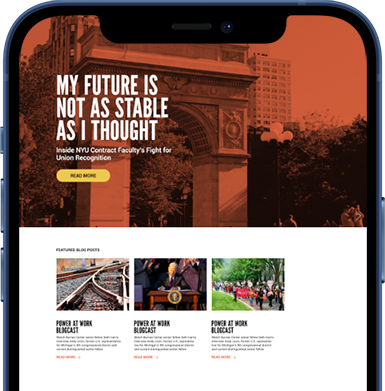Human beings get sick. It’s a natural part of the human condition. Yet, while illness is common, American workers getting paid sick leave from their employers is not; at least, not as common as it should be.
A doctor or public health professional would almost certainly tell you to stay home from work if you don’t feel well, especially if your illness is contagious. You shouldn’t risk infecting your co-workers. Also, rest is typically a part of the prescription for getting well, your body needs time and energy to fight the illness and recover. Both public health and basic decency argue for universal paid sick leave.
Workers have suffered through working sick for years, but the COVID-19 pandemic changed everything. Now, working sick can mean passing on a deadly virus or exacerbating an illness that’s much worse than the flu. The nation watched in horror as tens of thousands of essential workers --- from nurses to meatpacking workers to public transit employees --- died because they were exposed to COVID, very possibly at work. Paid sick leave is one of the top issues in the troubled negotiations between the nation’s freight railroad and the freight rail unions.
Despite calls from public health officials, millions of workers have no choice: they must go to work when they are sick or risk discipline or firing. According to the Bureau of Labor Statistics’ annual “Employee Benefits in the United States” study for 2022, almost one-quarter of private-industry workers do not receive paid sick leave from their employers. As of 2018, according to a Labor Department study, 44% of U.S. employees did not have a right to job-protected unpaid leave under the federal Family and Medical Leave Act. The FMLA guarantees unpaid leave only for “serious health conditions,” not run-of-the-mill illnesses, so many unprotected sick workers would not benefit even if covered.
The lowest paid workers are worst off, as they too often are. According to BLS’s Employee Benefits survey, only 55% of private-industry workers earning an average wage in the bottom quarter of all U.S. workers get paid sick leave. Only about half of part-time private-industry workers get paid sick leave. Only 62% of service workers get it, a category including food service workers. Think about that the next time you eat out.
What is the surest way to secure paid sick leave? Organize or join a union in your workplace. Again, according to BLS's study, 87% of union workers in the private sector get paid sick leave --- 11% more than non-union workers. An astonishing 98% of union members in the public sector have paid sick leave as one of their benefits --- also 11% more than their non-union counterparts.
Too often, the benefits of unionizing are simplified as higher wages and more job protection. While true, that's only a small part of the story. Paid sick leave is one of the many other critical benefits of union representation that should be front and center in the discussion about why workers need unions.

